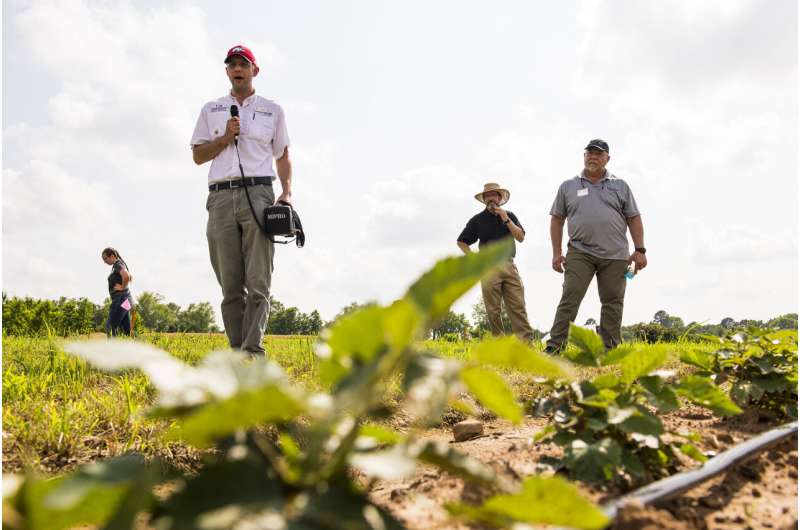This article has been reviewed according to Science X's editorial process and policies. Editors have highlighted the following attributes while ensuring the content's credibility:
fact-checked
proofread
'New' herbicides in blackberry production could soon be an option for growers

Two "new" herbicide options could soon be available for blackberry growers during the 2025 growing season.
Research by weed scientist Matt Bertucci, assistant professor of horticulture for the Arkansas Agricultural Experiment Station, shows that the herbicides 2,4D choline and glufosinate are safe and effective in blackberry production.
That research is now in the hands of the U.S. Department of Agriculture and the U.S. Environmental Protection Agency awaiting final approval before recommendations can be released to growers.
While these herbicides are not new to agriculture, their use in blackberry cultivation is a novel approach.
"We're excited about these results because they offer growers new tools for better weed control," said Bertucci, who discussed this research in an episode of the Food, Farms and Forests podcast. Food, Farms and Forests is produced by the experiment station, the research arm of the University of Arkansas System Division of Agriculture.
Blackberry growers face some challenges in weed control due to the crop's sensitivity to many commonly used herbicides. Additionally, the financial incentives for developing new herbicides specifically for blackberries are low compared to major row crops.
This is where the USDA's IR-4 Project comes into play, supporting the registration of pesticides for specialty crops like blackberries and ensuring that smaller but economically valuable crops receive resources needed for continued research.
"This support is crucial because it helps growers without the chemical companies bearing the full cost and logistical challenges of registration," Bertucci said.
The research team conducted trials over two years to evaluate the safety and effectiveness of 2,4D choline and glufosinate on blackberries. These chemicals are commonly used in crops such as rice, corn and soybeans, but this was the first study to test them extensively in blackberry fields.

Bertucci and his team found that established blackberry plants showed minimal, temporary damage symptoms from 2,4D choline, while glufosinate, when carefully applied, managed to control weeds without harming young blackberry plants.
2,4D choline, a synthetic herbicide known for its broadleaf weed control, was tested on established blackberry plants. The trials involved applications before the plants broke dormancy, during active growth, and post-harvest. Results showed comparable yields and only minor, short-lived damage to the plants, indicating that 2,4D choline can be a safe option for established blackberries, Bertucci said.
Glufosinate, a non-selective herbicide, was tested on newly planted blackberry plugs. The researchers used wax cartons to shield the young plants during herbicide application to avoid direct contact, which could harm the plants.
While glufosinate did cause some minor leaf burning, it was restricted to the lower parts of the plants and did not affect overall plant health, Bertucci said. It also helped control new blackberry shoots, reducing the need for manual pruning, he added.
"Currently registered products for post-emergence application in blackberries only control grassy weeds," Bertucci said. "2,4D choline and glufosinate will give us some broader activity and let us go after a different set of species that really can cause fits for our growers."
EPA approval pending
EPA approval is required before growers can legally use the herbicides on blackberries, Bertucci said. While the registration process can be lengthy, he remains hopeful that growers will be able to use these herbicides by the 2025 growing season.
"I'm very excited to do this type of work that growers are excited about implementing and using on their farms," Bertucci said. "It's very promising because I know that I have good news to deliver. I had a good discovery, and I'm just waiting to tell people, "Go forth and spray.'"
Collaborators of the research include Wayne Mitchem, Southern Region Small Fruit Consortium coordinator at North Carolina State University, and Marcelo Moretti, associate professor at Oregon State University. Moretti investigated the herbicides on raspberries.
Provided by University of Arkansas System Division of Agriculture




















